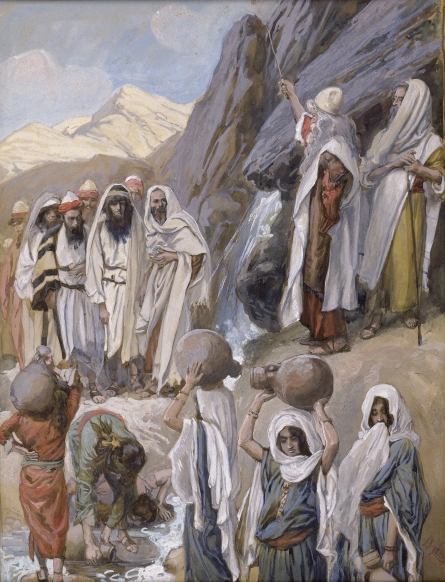Change of Heart
Lenten Sunday3 C (28 Feb 2016)
Homily of Fr. Paul Panaretos, S.J.
Here’s a way to appreciate today’s scriptures. While they feel unrelated, a Lenten thread runs through them. Let’s start with Jesus’ parable of the fig tree. With it he illustrated his comments on some headline tragedies in Galilee. Fig trees take four to five years to produce fruit.1 The gardener seemed more patient than the landowner who search[ed for] fruit on the fig tree…for three years. To be itself, the fig tree needed help. Again the gardener: Sir, leave it for this year also, and I shall cultivate the ground around it and fertilize it.
_-_James_Tissot.jpg) A Lenten view lets us notice the gardener in the parable stands for God. God is patient with us. That the fig tree stands for each of us calls loudly: we need helps of various kinds. Lenten practices are among the most important and effective for Christian living. I can hear someone object and say that Lent is not hard enough. Lent is not meant to be grueling or make us heroes. Another lesson from the fig tree helps our lenten living: fig trees need some pruning but not a lot.2 Any one of us could do a lot of different lenten practices; then we would lose sight of that one thing that prevents us from keeping up with Jesus at this season in our lives.
A Lenten view lets us notice the gardener in the parable stands for God. God is patient with us. That the fig tree stands for each of us calls loudly: we need helps of various kinds. Lenten practices are among the most important and effective for Christian living. I can hear someone object and say that Lent is not hard enough. Lent is not meant to be grueling or make us heroes. Another lesson from the fig tree helps our lenten living: fig trees need some pruning but not a lot.2 Any one of us could do a lot of different lenten practices; then we would lose sight of that one thing that prevents us from keeping up with Jesus at this season in our lives.
God’s patience with us and everyone means that our failings and sufferings do not surprise God. In their first meeting God was clear with Moses: I have witnessed the affliction of my people in Egypt and have heard their cry of complaint against their slave drivers, so I know well what they are suffering. Therefore I have come down to rescue them. Unless a person is unconscious, rescuers hope a person will play a part in the rescue-process. Lent is our annual time to make the Psalmist’s words ours: The Lord is kind and merciful; then put ourselves in the way of God’s patient kindness and mercy.
 Putting ourselves in the way of God’s mercy is being aware of it, trusting it. What St. Paul wrote to his Corinthian friends he desires equally for us: not…to be unaware. By our faith-mindfulness we best see Moses, Jesus, Mary, the saints and sainted people in our lives as models for us—models to follow.
Putting ourselves in the way of God’s mercy is being aware of it, trusting it. What St. Paul wrote to his Corinthian friends he desires equally for us: not…to be unaware. By our faith-mindfulness we best see Moses, Jesus, Mary, the saints and sainted people in our lives as models for us—models to follow.
Of some people God may ask something dramatic. Of most of us God asks us to be ourselves, to be true versions of the people our triune God creates each mo-ment. Living Lent helps us become more true by re-lying on God’s patient kindness and mercy. Living Lent also lets us feel our ongoing conversion pulls per-sistently at us. Its tug is another way God’s patience registers in us. The Lord…is patient toward [us], not willing that anyone should perish, but that all should come to repentance.3 Repentance is a change of mood, of heart that gives new shape to choices and actions. Changing our hearts allows God to work in us, with us and through us. Lent helps our hearts change so God in Jesus by Holy Spirit may help us bear fruit for the church and for our world.
In your daily 15 minutes with Jesus this week
- Pause to rest in our triune God.
- Ask Mary and the saints to present you to Jesus.
- Chat with him: praise him for dying and rising for you; thank him for giving you this Lent so you may follow him more freely and closely.
- Ask him for grace to drink in his patient kindness with you.
- Close saying slowly the Lord’s Prayer: Jesus gave to us his personal way of keeping his heart supple and living more aware of his Father and ours.
Link to this homily’s Spiritual Exercise
________________
- Rutgers University on fig trees.
- Kathleen Mierzejewski, gardening tip.
- 2Peter 3.9
____________
Wiki-image: Vinedresser and fig tree PD-US Moses strikes the rock PD-US
_-_James_Tissot_-_overall.jpg)
_-_James_Tissot.jpg)
_-_James_Tissot_-_overall.jpg)
_-_James_Tissot.jpg)


_-_James_Tissot_-_overall.jpg)